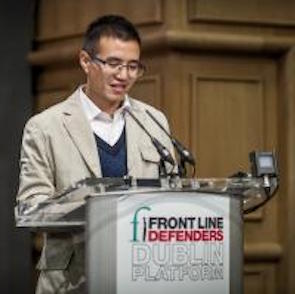As a human rights defender, I’m very happy to have this opportunity of being here and sharing my story and my experience with all of you. My name is Liu Yi. I’m 30 years old and I come from the western province of Sichuan in China. I’m currently the head of an NGO called the Education Center for Culture, Society and Human Rights.
I took part in human rights activities for the first time in 2002 when I was a college sophomore. That summer I went to a HIV-infected village in Henan province and did volunteer work for a month. I was deeply shaken by the fate of villagers who had been infected with HIV when selling blood. They were discriminated against; they were unable to receive justice; and their children could not go to school. Seared in my mind are scenes where they waited to die helplessly, lying on a wooden plank.
For the rest of my college years, I volunteered for various grassroots organizations to better understand the marginalized groups of the Chinese society. Graduating from college, I participated in the founding of the human rights organization China Tianwang Center for Human Rights. Following the arrest of the founder of Tianwang Center after the Sichuan earthquake in 2008, I and other volunteers founded another human rights organization, The Human Rights Campaign in China. It is a grassroots organization dedicated to providing support to victims of injustice in China.
I was 25 years old when Human Rights Campaign in China was founded. Probably due to my being young and lacking in experience, a mere four months after the founding of the new organization, I was arrested by the Chinese police for “illegally possessing state classified materials” and sentenced. After serving an 18-month prison term in Yingkou prison, Liaoning province, I was released in 2010.
After I was freed, I interviewed 37 human rights defenders who had been imprisoned or put in re-education-through-labor camps. I found that, in China, human rights defenders' communications and online expression are monitored ; we have no privacy; at important, sensitive times throughout the year, we are interrogated or threatened; many human rights defenders are thrown back into prison shortly after their release.
Imprisoned human rights defenders often are denied right to legal counsel and the right to receive family visits. In China’s prisons, we are subjected to long hours, strenuous labor, and some of our products are made for foreign brands to be exported to Europe and North America. Even though we know very well that it is a serious violation of international human rights laws and related principles to manufacture export products using prisoners, there is nothing we can do about it.
So, after the imprisonment, I founded the organization, Education Center for Culture, Society and Human Rights, which is dedicated to providing capacity-building training for Chinese rights defenders. The main purpose of this NGO is to provide information sharing, training and workshops, networking opportunities and other forms of support for Chinese rights defenders.
The organization has been operating for only three years, and we have been working on some small, tentative projects with regard to rights defenders. Here I would like to thank Front Line Defenders for providing support and training at the early stage of the organization. At the same time, I also look forward to exchanging views and experiences with rights defenders from around the world about capacity training of rights defenders.
In addition, our center also compiles a weekly Human Rights Briefing to provide information for rights defenders. Every week we collect, translate and circulate information about high-risk human rights defenders around the world. Interested friends are welcome to contact us, and we will spread, in the Chinese language, information about high-risk rights defenders in your country. Let’s work together to pay attention to, and support, these high-risk human rights defenders.

in China, human rights defenders' communications and online expression are monitored ; we have no privacy; at important, sensitive times throughout the year, we are interrogated or threatened; many human rights defenders are thrown back into prison shortly after their release.
